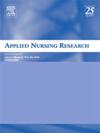Online recruitment for an online survey study: Our experience of dealing with fraudsters
IF 2.7
4区 医学
Q1 NURSING
引用次数: 0
Abstract
Background
Online recruitment is cost efficient and can reach large sample size. It helps protect participants' privacy and confidentiality and is commonly used in research studies with sensitive topics and hard-to-reach target participants. However, widespread fraudulent responses along with missing data and multiple entries add complication to the data cleaning and analysis. This clinical-methods-brief described our experience of dealing with fraudsters in the recruitment process of an online study.
Methods
Based on our experience in an online cross-sectional survey study, we reported three methods used in the recruitment process, including website recruitment (https://www.chineseinla.com/), Facebook advertisement, and Facebook group recruitment.
Results
The detected fraudulent rates were 11.11 %, 4.55 %, and 82.69 % for website recruitment, Facebook advertisement, and Facebook group recruitment, respectively. Strategies for us to identify the fake responses mainly included internet protocol checking, conflict answers to different survey questions, participant's name, and time stamp checking.
Discussion
Fake data mixed in the research data threatens the validity and reliability of the study and may skew the research study results. A robust participant recruitment method and a data screening/cleaning protocol are necessary to ensure online studies' rigorous.
在线调查研究的在线招聘:我们与欺诈者打交道的经验
背景网上招募具有成本效益,而且样本量大。它有助于保护参与者的隐私和机密,常用于敏感话题和难以接触到目标参与者的研究。然而,普遍存在的虚假回复、数据缺失和多重输入等问题给数据清理和分析工作增加了复杂性。本临床方法简报介绍了我们在一项在线研究的招募过程中与欺诈者打交道的经验。方法基于我们在一项在线横断面调查研究中的经验,我们报告了招募过程中使用的三种方法,包括网站招募(https://www.chineseinla.com/)、Facebook广告和Facebook小组招募。结果网站招募、Facebook广告和Facebook小组招募中发现的欺诈率分别为11.11%、4.55%和82.69%。我们识别虚假回答的策略主要包括互联网协议检查、不同调查问题的冲突答案、参与者姓名和时间戳检查。 讨论研究数据中混入虚假数据会威胁研究的有效性和可靠性,并可能使研究结果出现偏差。为确保在线研究的严谨性,有必要采用可靠的参与者招募方法和数据筛选/清理协议。
本文章由计算机程序翻译,如有差异,请以英文原文为准。
求助全文
约1分钟内获得全文
求助全文
来源期刊

Applied Nursing Research
医学-护理
CiteScore
4.50
自引率
0.00%
发文量
65
审稿时长
70 days
期刊介绍:
Applied Nursing Research presents original, peer-reviewed research findings clearly and directly for clinical applications in all nursing specialties. Regular features include "Ask the Experts," research briefs, clinical methods, book reviews, news and announcements, and an editorial section. Applied Nursing Research covers such areas as pain management, patient education, discharge planning, nursing diagnosis, job stress in nursing, nursing influence on length of hospital stay, and nurse/physician collaboration.
 求助内容:
求助内容: 应助结果提醒方式:
应助结果提醒方式:


